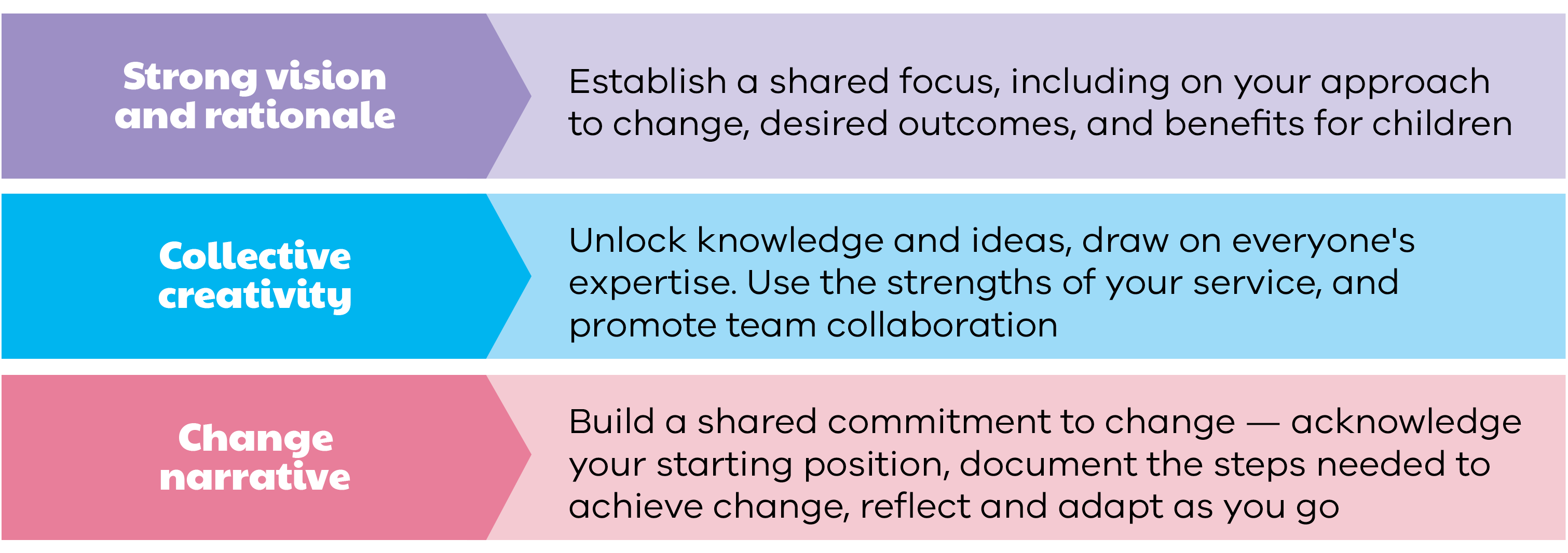Overview
The way your service makes changes to deliver the reforms will depend on what is right for your team and community. Use your knowledge of your service’s unique needs and strengths to lead change in a way that supports and motivates your staff and provides the best outcomes for children and communities.
Three core change principles
How you approach change as a leader will influence how your staff and community experience and respond to changes. Setting a positive tone can inspire and motivate your team.
While there is no ‘one size fits all’ approach to leading change, there are some principles that have been identified by experts as being important.
The following 3 core principles for successfully leading change are based on research with leaders in early childhood services.
- Having a strong vision and rationale and defining ‘why we are doing this’ will provide a touch point as you implement change.
- Awareness of the benefits of Pre-Prep – for example, more hours can increase children’s early literacy, numeracy and social skills – and the overall aims of the reforms will help you establish this vision with your team.
- By regularly asking ‘Will this step move us closer to realising our vision?’ and ‘Is this change still focused on our agreed outcomes?’, you will be able to keep the change process on track.
- Encouraging the collective creativity of your team will strengthen your change process by drawing on all the available knowledge, skills, and experience of everyone involved.
- Create space for your team to problem-solve challenges, including those relating to practice change.
- Look to your team for ideas about implementing the agreed changes, reach out to other professionals for advice, and explore your planned changes with families and children.
- Maintaining a narrative of change will help your team make sense of where you began, what stage you are at, and where you want to get to.
- You can document your change narrative in a range of ways, such as minutes of formal meetings, on a wall planner or in a simple diagram. Highlighting past achievements can motivate your team and provide a strong foundation for present and future changes.
Watch Professor Nuttall describe these principles for leading change at a 2024 Early Learning Leadership Forum.
Importance of communication
Effective communication underpins the 3 principles for leading change. How you communicate will be critical to creating ongoing awareness and promoting shared understanding. This applies to your team as well as families and carers in your community.
Change can sometimes create uncertainty, and misinformation can hinder the success of your change initiatives. Communicate clearly and transparently and provide regular updates on the reforms and changes at your service, as they happen.
See the Engaging and working with your team and Communicating with families sections of this toolkit, and the Best Start, Best Life Talking points (PDF, 60.7KB).
Overcoming barriers to change
Your team may experience the prospect and process of change in different ways – some may feel energised and enthusiastic, and others may feel uncomfortable or unsettled. Some may be hesitant to embark on a new change process. It’s important to have discussions with your staff before you make any changes.
Focusing on what your team does well and having relationships with each other that are based on positive regard can support and sustain the culture at your service as you undergo changes.
If resistance comes up, revisit the core principles for leading change. Talking about the reasons for change and desired outcomes can help everyone make sense of new ways of working. These conversations and feedback may lead to adjustments to how your service is organised or identify any materials and resources needed to support the change.
Invite staff to play a role in solving an issue they identify. Generating possible solutions through brainstorming, researching and consulting others can expand your options and increase your collective creativity.
Where possible, consider likely sources of resistance in advance of meeting with your team so that you can more proactively address concerns and offer support.
Resources
References
- Leadership in Early Childhood, A cultural-historical theory of practice development. Joce Nuttall, Linda Henderson, Elizabeth Wood, Jenny Martin. 2024.
Updated
